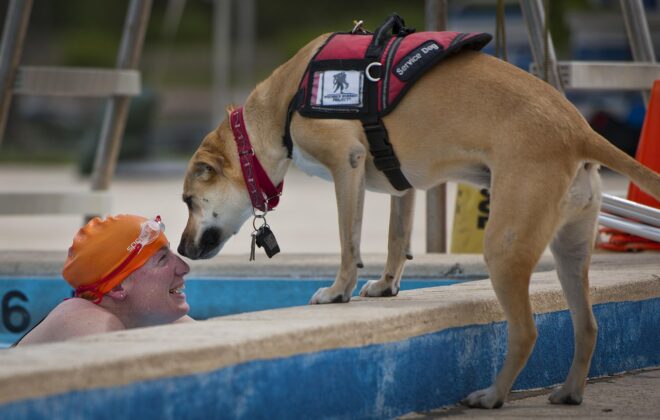Bringing Home a Rescue Dog: What You Need to Know
Bringing home a rescue dog can be one of the most rewarding things that you can do as an animal lover. If you start this new relationship off right, you will have many wonderful years to look forward to with your new furry friend. Here is a list of key things to do and remember when you bring your new friend home!
Be Prepared.
The best thing that you can do for your new arrival is to have things ready for them long before they join your home. Here are the items you will need for your new housemate:
- A quality dog food along with a measuring cup. Never eyeball or estimate food amounts. It can lead to under- or over-feeding your dog.
- An airtight container to store dry dog food so that it does not get stale.
- Food and water bowls located in an easily accessible area.
- A sturdy collar and leash. Avoid collars with plastic buckles and D-rings as they tend to break more easily than metal ones. I prefer a belt buckle style collar for my dogs and a 4 foot long by 1 inch wide leash with a padded handle.
- A sturdy kennel. Try to avoid wire kennels. They are less expensive but typically less reliable than their plastic counterparts.
- Grooming tools. People often forget that all dogs need grooming. Some dogs only require a quick brushing occasionally while others need to be professionally groomed every 6 to 8 weeks. Don’t forget to clip their nails as well! Be sure you are aware of the grooming requirements of any dog before you bring them home.
- Toys to keep them occupied while you are away.
Research The Individual Dog.
Ask the rescue or shelter questions about any dogs that you are interested in such as:
- What is the dog’s ideal home environment? (I.E. active home, a calm environment, older children vs. younger ones, single dog home)
- Has temperament testing been done and if so what were the results? This is important information to relay to your behaviorist. For a free consultation, send us an email at info@lostcreektraining.com!
- What condition was the dog found in? (Ex. malnourished, always chained up, street dog, etc.) This information is important as it can help a behaviorist predict any complications you may encounter with your new housemate. If you need assistance deciphering any behavior Lost Creek offers free phone consultations! Give us a call at (308) 455-0235.
- Has any training or behavior modification been applied since the dog has been in the shelter or rescue? What methodology was used? Again, this is all important information to give to your behaviorist.
- How much food does the dog need to reach or maintain a healthy body weight?
- Is the dog potty trained? Keep in mind that even potty trained dogs can have accidents in a new environment when they are unsure of where and when to go potty. For tips and tricks on House Training, download our free E-Book!
- What grooming requirements does this dog have? If your dog requires regular grooming, it is best to contact groomers in your area before you bring your dog home to find one that has a clean salon and a good reputation with other clients. Groomers are often booked out months in advance so do not wait to schedule your dog’s first visit!
- Is the dog up to date on all vaccinations and on an intestinal and heartworm de-worming regimen? When are their boosters due? Do they have a local veterinarian that they recommend for follow-up visits?
- Does the dog have any special needs, such as grain free diet or daily medication?
You will also need to research the exercise requirements and typical temperament of the breed of the dog(s). Labrador retrievers have very different requirements than Chihuahuas.
If you have never owned a dog before (or could use a refresher) visit our blog post What I Wish I Had Known Before I Got A Dog.
Consider any existing pets.
One of the most important things to consider when thinking of bringing a rescue dog into your home is if they will be able to co-exist with any other animals you have. Some dogs are not fans of cats. Others may have a high prey drive which could put any livestock at risk.
Be sure to ask the rescue/shelter about any interactions they are aware of between the dog and other animals. It is also best to do a meet and greet with any household animals before finalizing the adoption.
For tips on how to properly introduce dogs, read this excellent blog post: Introducing A New Dog to A Home With Resident Dogs by Renee DiPietro, LVT, Permitted Wildlife Rehabilitator.
Consult an expert.
Some shelter dogs will come to you with problem behaviors. Unfortunately, that is often the reason many are surrendered in the first place. It’s not their fault, but this is something you need to be aware of. Fortunately, there are people that can help!
It is in your best interest to have a behavior consultation with a qualified trainer shortly after you bring your new dog home. They will be able to tell you what to expect from your new pooch and show you how to effectively communicate with them as well.
We offer one free training session for every rescue or shelter dog within 60 days of adoption!
We believe that every dog deserves a loving home with owners that know how to communicate with them. Send us an email at info@lostcreektraining.com to schedule your free session today!
Enforce the rules.
It is far too easy to let yourself “feel bad” for your rescue pup for what they may have been through and therefore allow them to break the rules out of “compassion.” Dog’s, like all other animals, thrive on a structured environment. What your rules are does not matter as long they are acceptable to the entire household. The most important thing about your rules is that you stick to them 100% of the time.
Unlike humans, if dog’s are given an opportunity to do something, they accept that as the norm. For example, if you allow your dog to jump up on you one time without permission, they now believe that this is acceptable all of the time.
When rules are not consistently enforced, a dog that misbehaves is only the tip of the iceberg. Serious behavioral problems can, and will occur. This includes house soiling, destructive behavior, possessiveness and worst of all, aggression towards you and your family.
Thank you for taking the time to read my blog. I truly believe that with diligent education of the general public by expert trainers, we can improve lives of dogs around the world! Remember to Keep Calm and Get Lost at The Creek!

Tiffany Buerer has almost half a decade of training experience with Lost Creek. She is an expert in obedience training, and she has helped rehabilitate hundreds of aggressive dogs. She has also assisted with the training and certification of multiple Service Dogs and Therapy Dogs through Lost Creek’s Service Dog Training & Certification Program and Therapy Dog Training & Certification Program.
Related Posts
Leave a Reply Cancel reply
You must be logged in to post a comment.
Search our site
Categories
- Confessions of a Bad Dog Owner Column (1)
- Inspiration (1)
- Medical (3)
- Products We've Reviewed (1)
- Tips & tricks (8)
- Uncategorized (3)




